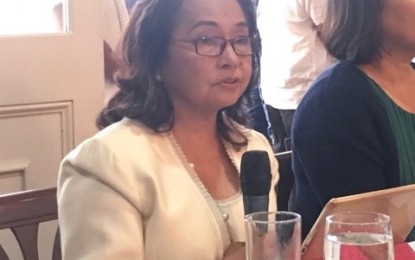
House Speaker Gloria Macapagal-Arroyo.
MANILA -- Speaker Gloria Macapagal-Arroyo on Wednesday commended President Rodrigo Duterte’s economic managers for their decisive actions that has steadily eased Philippines' headline inflation, from a peak of 6.7 percent in October 2018 to just 3.0 percent in April this year.
“Good. Congratulations to our economic managers,” the former president said in an ambush interview.
When asked what she thinks contributed to the decelerating inflation, Arroyo pointed to the slew of measures that the economic managers recommended to address the rising prices. “Well, they are working,” she said.
The Philippine Statistics Authority (PSA) reported Tuesday that the increase in consumer prices slowed further to 3.0 percent in April, from 3.3 percent in March, primarily due to the falling cost of food, housing and utilities.
The April inflation figure is the lowest level since January 2018, and marked the sixth month that headline inflation has decelerated since peaking at 6.7 percent in September and October last year.
When inflation spiked in 2018 to above 6 percent starting in August, the Cabinet’s Economic Development Cluster led by Finance Secretary Carlos Dominguez III acted promptly and decisively to rein in the rising inflation rate.
They recommended a slew of measures that would help ease the impact of elevated inflation on consumers.
The economic team's recommendations were immediately acted upon by President Duterte through the issuance of several directives on Sept. 21, 2018.
Among them were Administrative Order (AO) No. 13, which removed administrative restrictions on the importation of agricultural products; and Memorandum Order (MO) No. 26 directing the Departments of Agriculture (DA) and Trade and Industry (DTI) to implement measures to reduce the gap between the farm gate and retail prices of agricultural products.
Duterte also issued MO 27, which ordered the DA, Department of the Interior and Local Government, Philippine National Police, and the Metropolitan Manila Development Authority to “adopt measures to ensure the efficient and seamless delivery” of imported agricultural and fishery products from ports to markets; while MO 28 directed the National Food Authority (NFA) to immediately release existing rice stocks in its warehouses.
The other Presidential directives included instructing: the DTI, NFA, PNP, National Bureau of Investigation (NBI) and farmers’ groups to form monitoring teams to closely watch over the transport of rice from ports to NFA warehouses and retail outlets; and the DA to replicate the issuance of certificates of necessity to allow fish imports to be distributed in Metro Manila’s wet markets and other markets of the country.
Duterte also instructed the DTI to set up public markets where producers can sell their goods directly to consumers, as a way to reduce the gap between the farm gate and retail prices of chicken and other products; the Sugar Regulatory Administration to open sugar imports to direct users; and the Bureau of Customs to prioritize the release of essential food items in the ports.
These supply-side measures complemented the monetary decisions of the Bangko Sentral ng Pilipinas (BSP) to nip the rising inflation in the bud.
Meanwhile, President Duterte’s signing of the Rice Tariffication Act (RA 11203) last February is expected to further ease inflation by the end of the year.
The rice tariffication law has been vigorously pushed by Duterte's economic managers as one way to address inflation. (PNA)
